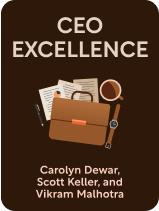1-Page Summary1-Page Book Summary of CEO Excellence
How do the world’s best Chief Executive Officers (CEOs) run their businesses? What do they all have in common? These are the questions that Carolyn Dewar, Scott Keller, and Vikram Malhotra sought to answer when they interviewed 67 highly successful CEOs and compiled their findings into CEO Excellence (2022). By doing so, they’ve created a unique guide to help you emulate the mindsets and practices of some of the best business leaders on the planet.
The authors are all senior partners at McKinsey & Company, one of the world’s most prestigious management consulting firms. Dewar is the founder and co-leader of McKinsey’s CEO Practice, where she works with executives and board members to boost their effectiveness. Keller leads the firm's organizational health and leadership development...
Want to learn the ideas in CEO Excellence better than ever?
Unlock the full book summary of CEO Excellence by signing up for Shortform.
Shortform summaries help you learn 10x better by:
- Being 100% clear and logical: you learn complicated ideas, explained simply
- Adding original insights and analysis, expanding on the book
- Interactive exercises: apply the book's ideas to your own life with our educators' guidance.
Here's a preview of the rest of Shortform's CEO Excellence summary:
CEO Excellence Summary Key Area #1: Company Direction
Dewar, Keller, and Malhotra begin by exploring what most people likely picture when they think of a CEO’s job: making big decisions about the company’s strategy and future. This first section will discuss the two seemingly contradictory elements you must balance as you decide the company’s direction: boldness and risk management.
Make Big, Bold Moves
Dewar, Keller, and Malhotra say the most successful CEOs approach corporate leadership with a bold and fearless attitude. Rather than trying to minimize mistakes and failures, you should embrace uncertainty by chasing high-risk, high-reward opportunities. Some examples include buying or merging with other companies, investing heavily in company growth (as opposed to shielding the assets you already have), and regularly experimenting with new methods and tools to boost productivity or reduce overhead costs.
The authors argue this bold mindset is necessary because a tiny fraction of companies make the vast majority of the world’s profits, and the odds that your company will be one of them are extremely low. Think of it like the lottery: The only way to win is to play, and the more tickets you buy—which is to say, the...
CEO Excellence Summary Key Area #2: Organizational Unity
Managing a company may be what most people associate with the role of CEO, but that’s only one part of your duties. As a leader, you’re also responsible for managing people: keeping everyone from your leadership team to your customers happy, and making sure everyone works toward the same goals.
In this section, we’ll discuss three areas where your soft skills can make the difference between being an average CEO and an exceptional one:
- Guiding and energizing your leadership team
- Building strong relationships with the organization’s board of directors
- Connecting with company stakeholders
Leadership Guidance
Dewar, Keller, and Malhotra say that your executive team’s effectiveness significantly impacts company performance. However, more than half of senior executives report that their company's top team underperforms. These shortfalls often stem from friction within the leadership team rather than from any lack of intelligence or competence.
Therefore, the authors urge you to prioritize team dynamics: Choose people who can set aside their personal agendas for the good of the company, who support one another instead of tearing each other down, and who...
What Our Readers Say
This is the best summary of How to Win Friends and Influence People I've ever read. The way you explained the ideas and connected them to other books was amazing.
CEO Excellence Summary Key Area #3: Self-Care
So far we’ve been discussing how to manage your various responsibilities to your company, but Dewar, Keller, and Malhotra urge you to remember that you also have responsibilities to yourself. They write that many executives overlook the importance of self-care, which is a critical mistake—your well-being is crucial to both your effectiveness as a CEO and your personal happiness. In this final section, we’ll discuss two strategies that can help you protect your physical and mental health: effectively managing your time and attention, and having a strong sense of identity.
Manage Your Time and Attention
Dewar, Keller, and Malhotra assert that the demands of a CEO position, and the schedule required to meet those demands, are often overwhelming. It’s therefore crucial to effectively manage your time and energy to avoid exhausting yourself. Approach your role as a series of short but high-intensity working periods, and deliberately leave yourself periods of rest in between.
(Shortform note: In Feel-Good Productivity, entrepreneur Ali Abdaal expands on the need to manage your time and energy...
Shortform Exercise: Start Planning Your Time as CEO
Now that you’re familiar with the key principles of CEO Excellence, think about how you could apply them to running your own company (or the company you hope to run in the future).
If you had to write a vision statement for your organization right now, what would it be? Alternatively, what is your vision—what do you hope the company will achieve with you at the helm?
Why people love using Shortform
"I LOVE Shortform as these are the BEST summaries I’ve ever seen...and I’ve looked at lots of similar sites. The 1-page summary and then the longer, complete version are so useful. I read Shortform nearly every day."
 Jerry McPhee
Jerry McPhee

